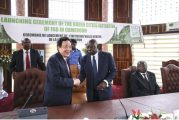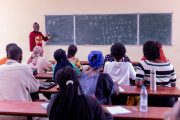Categories
Recent Posts
- Southern Cameroons refugees in Nigeria receive farm seedlings
- Douala: Investment Forum wraps up with honors for investment champions
- Understanding the Biya Francophone regime’s support for the Israeli genocide in Gaza
- US: Prosecution lays out ‘criminal conspiracy’ as Trump’s hush money trial opens
- FAO formally launches Green Cities Initiative in Cameroon
Archives
- April 2024
- March 2024
- February 2024
- January 2024
- December 2023
- November 2023
- October 2023
- September 2023
- August 2023
- July 2023
- June 2023
- May 2023
- April 2023
- March 2023
- February 2023
- January 2023
- December 2022
- November 2022
- October 2022
- September 2022
- August 2022
- July 2022
- June 2022
- May 2022
- April 2022
- March 2022
- February 2022
- January 2022
- December 2021
- November 2021
- October 2021
- September 2021
- August 2021
- July 2021
- June 2021
- May 2021
- April 2021
- March 2021
- February 2021
- January 2021
- December 2020
- November 2020
- October 2020
- September 2020
- August 2020
- July 2020
- June 2020
- May 2020
- April 2020
- March 2020
- February 2020
- January 2020
- December 2019
- November 2019
- October 2019
- September 2019
- August 2019
- July 2019
- June 2019
- May 2019
- April 2019
- March 2019
- February 2019
- January 2019
- December 2018
- November 2018
- October 2018
- September 2018
- August 2018
- July 2018
- June 2018
- May 2018
- April 2018
- March 2018
- February 2018
- January 2018
- December 2017
- November 2017
- October 2017
- September 2017
- August 2017
- July 2017
- June 2017
- May 2017
- April 2017
- March 2017
- February 2017
- January 2017
- December 2016
- November 2016
- October 2016
- September 2016
- August 2016
- July 2016
- June 2016
Featured
 Understanding the Biya Francophone regime’s support for the Israeli genocide in Gaza
Understanding the Biya Francophone regime’s support for the Israeli genocide in Gaza  Poverty under Biya: Cameroonians embrace Chinese language for brighter futures
Poverty under Biya: Cameroonians embrace Chinese language for brighter futures  Cameroon is broken: Who can fix it?
Cameroon is broken: Who can fix it?  Ethiopia: U.S Senator Cardin Statement on the Killing of Bate Urgessa
Ethiopia: U.S Senator Cardin Statement on the Killing of Bate Urgessa  Battle for the Unity Palace: ANNOUNCEMENT!
Battle for the Unity Palace: ANNOUNCEMENT!
Most Commented Posts
 4 Anglophone detainees killed in Yaounde
4 Anglophone detainees killed in Yaounde
19 comments Chantal Biya says she will return to Cameroon if General Ivo Yenwo, Martin Belinga Eboutou and Ferdinand Ngoh Ngoh are sacked
Chantal Biya says she will return to Cameroon if General Ivo Yenwo, Martin Belinga Eboutou and Ferdinand Ngoh Ngoh are sacked
13 comments Anglophone Nationalism: Barrister Eyambe says “hidden plans are at work”
Anglophone Nationalism: Barrister Eyambe says “hidden plans are at work”
12 comments The Anglophone Problem – When Facts don’t Lie
The Anglophone Problem – When Facts don’t Lie
12 comments Largest wave of arrest by BIR in Bamenda
Largest wave of arrest by BIR in Bamenda
10 comments
Latest Tweets
Featured
-

Southern Cameroons refugees in Nigeria receive farm seedlings
-

Douala: Investment Forum wraps up with honors for investment champions
-

Understanding the Biya Francophone regime’s support for the Israeli genocide in Gaza
-

US: Prosecution lays out ‘criminal conspiracy’ as Trump’s hush money trial opens
-

FAO formally launches Green Cities Initiative in Cameroon
-

Football: Barcelona wants Clasico replay if Yamal ‘ghost goal’ call wrong
-

Poverty under Biya: Cameroonians embrace Chinese language for brighter futures
© Cameroon Concord News 2024
19, January 2018
Where French Cameroun stands on Biya’s war in Ambazonia 0
The military wheels are already in motion and according to Cameroon Intelligence Report sources ‘coup plans have been laid out for a complete annihilation of the Biya regime using the Southern Cameroons crises as a justification. Anti Biya movements are gaining support from a majority of the French Cameroun population, shown in an 8 region survey in this January. A Cameroon Concord News Group poll showed 92 per cent of interviewees favoured taking military action to end President Paul Biya’s rule.
Far North region
The Biya regime had used the current Vice Prime Minister Amadou Ali to control the politics of the Far North region over the last 35 years. Amadou Ali has stifled any resistance against Biya in the Far North with an iron fist. The dilemma for President Biya is that the patriarch of the Far North is no longer in charge. To be sure, his ancestors are calling and things are falling apart from Maroua via Mora to Fotokol.
West Region
The Bamilekes and the people of Foumban were adamant that Southern Cameroons and La Republique abide by Foumban resolutions. Although the Bamilekes made a mockery of Ambazonians at the very beginning of the crisis and called for more punitive measures from the Biya Francophone regime, ultimately the West region is backing a military action against the Biya regime. A coup they say will normalize relations with Southern Cameroons and business will start to flow again. Recently the Bamileke media houses have been clamoring for genuine dialogue.
Littoral region
Except for their CPDM leader Justice Minister Laurent Esso, the Sawas including those who militate with the ruling CPDM party have taken a stand in favour of a military action against the Biya regime. Some influential Sawa political elites who participated in our survey said any government installed in Yaoundé via a military coup will not last long. The Littoral soldiers in the army are among those who have killed hundreds of Southern Cameroonians ever since the Anglophone uprising started more than a year ago.
South Region
The Francophone Defence Minister Joseph Beti Assomo has ordered troops to remain committed and loyal to the 84 year old commander-in-chief President Paul Biya. Assomo and a cream of French Cameroun political elites from the South have affirmed support for La Republique-led war against Southern Cameroonians. But majorities of the people of the South have said Biya should be forced out of office and that the sons and daughters of the South region should be ‘militarily involved’.
Central Region
The Yaoundé political elites are ‘approaching the point of a decision’ on participating in ending Biya’s 35 years in power. But many said that the Central region will wait until signs of collapse become imminent before they will make a commitment to join the anti Biya movement.
North region
The North is historically suspicious of any anti Biya movement in Cameroon that does not speak of a possible replacement coming from Garoua. They have always sought to improve relations with the Biya Francophone Beti Ewondo regime and are showing support for the ruling CPDM crime syndicate. They privately back a military intervention to end Biya’s rule, but would reluctantly support the move.
East region
While publicly the people are against a military action in Yaoundé, many of them have said that a coup action against Biya would be legitimate provided it has the support of all the sectors of the armed forces. Interestingly, the situation in the Central African Republic has greatly affected the East region, lessening the sympathy vote for Mr. Biya.
Adamawa
The traditional and spiritual leaders of the Adamawa region have been calling for a peaceful transfer of power to the younger generation. They appear to be preparing their indigents for a possible conflict in Yaoundé in the 2018 presidential elections and recently cautioned military leaders to be prepared for all eventualities. Our survey indicated the people of Adamawa oppose any coup in Yaoundé.
By Soter Tarh Agbaw-Ebai